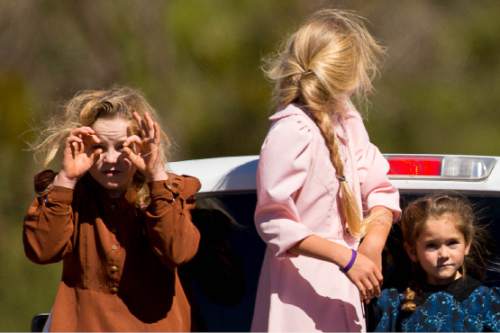This is an archived article that was published on sltrib.com in 2015, and information in the article may be outdated. It is provided only for personal research purposes and may not be reprinted.
Two towns on the Utah-Arizona line scored a courtroom victory Wednesday when a federal judge found there isn't yet enough evidence of whether the towns discriminated against people who don't follow a polygamous church.
The judge also denied a Hildale, Utah, and Colorado City, Ariz., motion to dismiss one count of the lawsuit, but on the whole the ruling appeared more favorable to the towns than to the U.S. Department of Justice.
The ruling means the Justice Department will have to prove its case to a jury in a federal courtroom in Phoenix. All sides will argue over who really runs Hildale and Colorado City — the town governments or the Fundamentalist Church of Jesus Christ of Latter-Day Saints?
A trial has not yet been scheduled.
The Justice Department had asked for what is called a summary judgment in its favor.
Justice Department lawyers have contended the marshals in Hildale and Colorado City , collectively known as Short Creek, selectively enforce the law based on whether someone is in good standing with the FLDS. In the second count of its lawsuit, the Justice Department accuses the municipal governments of housing discrimination by denying utility connections and other services to some former church followers and that marshals prevented people from living in homes owned by a community trust.
But in his ruling Wednesday, U. S. District Judge H. Russell Holland found there were too many disputed facts as to whether patterns of discrimination exist. He wrote that the Justice Department was relying too heavily on the findings in another lawsuit in which it was a party — Ron and Jinjer Cooke's suit against the towns for failure to provide a water connection.
A jury last year found discrimination and awarded the Cookes $5.2 million. The Cookes and the towns later settled the case for $3 million.
Holland said the Justice Department lawsuit against Short Creek is broader than the issues in the Cooke case and summary judgment couldn't be issued.
Holland also barred the Justice Department from seeking damages for four former FLDS church members who claimed they suffered discrimination. Holland said there was no evidence they suffered significant injury. Twelve other individuals remain eligible for damages to be proven at trial.
The judge's decision wasn't all bad for the Justice Department. Besides denying Hildale and Colorado City's motion to dismiss the count of discrimination by the marshals, Holland said the Justice Department can seek to prove the marshals violated the First, Fourth and 14th Amendment rights of complainants. Lawyers for the towns wanted the case to be limited to the 14th Amendment, which grants equal protection under the law.
Attorney Blake Hamilton, representing Hildale, said Thursday he was pleased with the decision.
"With a motion like this, it's generally a mixed bag and that's what it was here," Hamilton said. "But it's good to see the judge denied their motion for summary judgment."
Hamilton said the next step will be filing motions about what evidence will be admitted at trial. He said the federal government has about 100 witnesses it could call.
Attorneys for the Justice Department and the town of Colorado City did not reply to requests for comment.
Twitter: @natecarlisle





